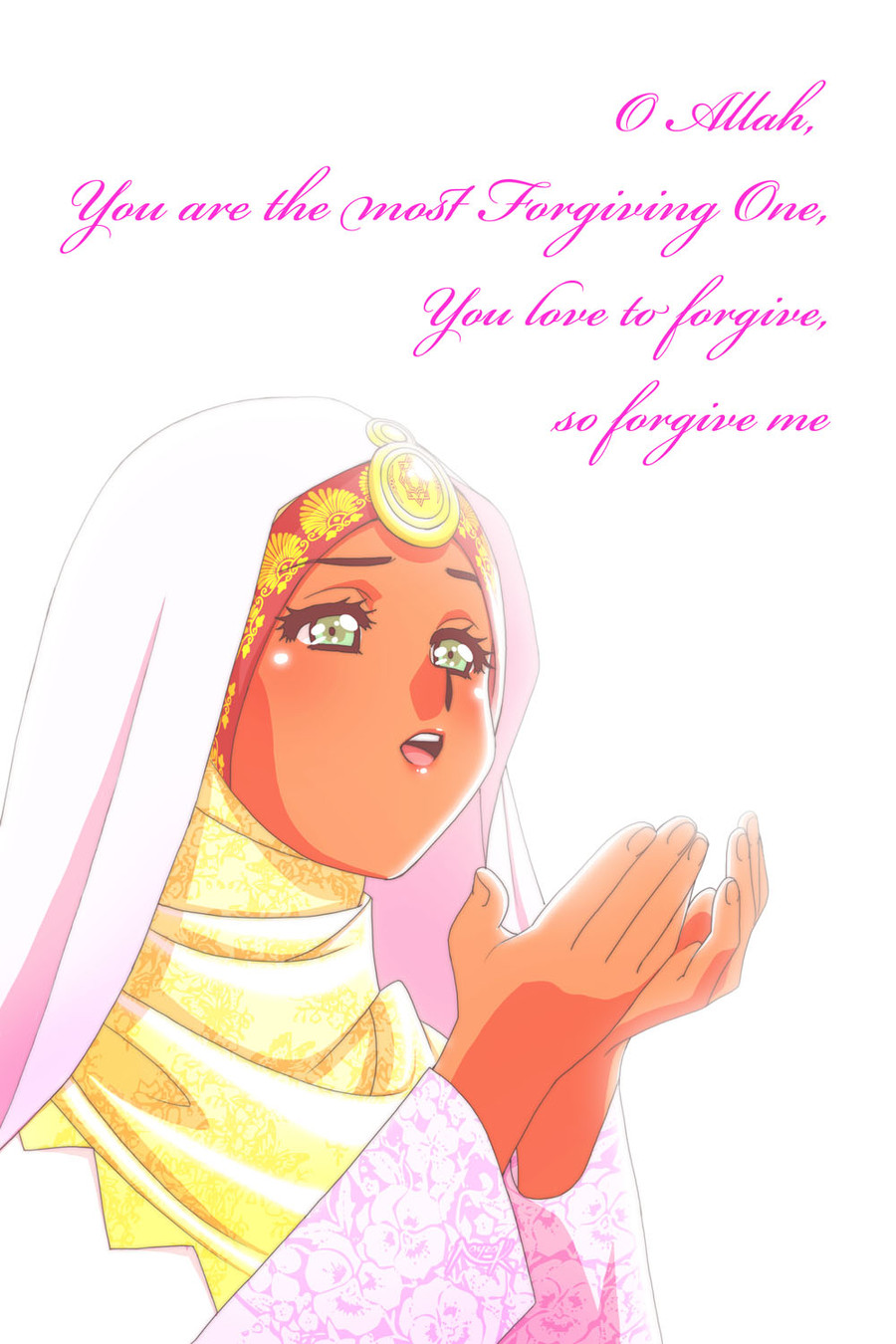HOME | DD
 Nayzak — Forgiveness - part 1
Nayzak — Forgiveness - part 1

Published: 2012-01-26 02:45:42 +0000 UTC; Views: 18774; Favourites: 219; Downloads: 354
Redirect to original
Description
Assalaamu alaikum [Peace be to you],Allah, the God, Glory be to him, has granted intellect to human beings. The intellect entails responsibility. The more intellect a person has the more he/she is responsible. When the intellect is missing, the responsibility is also not there. Little children are not held responsible, because their intellect has not yet developed. The insane are not responsible, because they have lost the intellectual capacity. However, part of our being human is also that we make mistakes. Sometime we make mistakes without deliberation and intention. But sometime we knowingly and deliberately sin and do wrong to others. It is said, “to err is human and to forgive is divine.” Both parts of this statement are very true. As human beings we are responsible, but we do also make mistakes and we are constantly in need of forgiveness.
Islam speaks about two aspects of forgiveness:
a) Allah's forgiveness;
b) Human forgiveness.
We need both, because we do wrong in our relations to Allah as well as in our relations to each other.
in this article, I will try to talk about Allah's forgiveness. and leave Human forgiveness for next time, in sha'Allah [God willing].




 A. Allah’s Forgiveness:
A. Allah’s Forgiveness:The almighty God is the most Forgiving. There are many names of Allah given in the holy Qur’an. Some of these names are related to His mercy and forgiveness. Let me mention some of these names:




 الغفور Al-Ghafoor: The most Forgiving. This name occurs in the Qur’an more than seventy times. There are other names from the same root, such as غافر Ghafir and غفار Ghaffar. The meaning of the Arabic root غفر “gha.fa.ra” is to cover, to hide and from it comes the meaning “to excuse”, “to pardon”, “to remit” and “to forgive”. Allah does all these things. In the Qur’an, it is mentioned that Allah does not forgive the Shirk* (without repentance) but He may forgive every other sin for whomsoever He wills. therefore We must turn to Allah to seek His forgiveness.
الغفور Al-Ghafoor: The most Forgiving. This name occurs in the Qur’an more than seventy times. There are other names from the same root, such as غافر Ghafir and غفار Ghaffar. The meaning of the Arabic root غفر “gha.fa.ra” is to cover, to hide and from it comes the meaning “to excuse”, “to pardon”, “to remit” and “to forgive”. Allah does all these things. In the Qur’an, it is mentioned that Allah does not forgive the Shirk* (without repentance) but He may forgive every other sin for whomsoever He wills. therefore We must turn to Allah to seek His forgiveness.the prophet Mohammed -peace be upon him- reported that the God said:
"O son of Adam, as long as you call upon Me and put your hope in Me, I have forgiven you for what you have done and I do not mind. O son of Adam, if your sins were to reach the clouds of the sky and then you would seek My forgiveness, I would forgive you. O son of Adam, if you were to come to Me with sins that are close to filling the earth and then you would meet Me without ascribing any partners with Me, I would certainly bring to you forgiveness close to filling it."




 العفو Al-’Afuw: This has another aspect of forgiveness. This name occurs in the Qur’an five times. Literally the Arabic word عفو ‘Afw means “to release” “to heal”, “to restore”, “to remit”. Thus in relation to Allah it means “to release us from the burden of punishment due to our sins and mistakes”, “to restore our honor after we have dishonored ourselves by committing sins and making mistakes.” Sometimes in the Qur’an both names: ‘Afuw and Ghafoor come together.
العفو Al-’Afuw: This has another aspect of forgiveness. This name occurs in the Qur’an five times. Literally the Arabic word عفو ‘Afw means “to release” “to heal”, “to restore”, “to remit”. Thus in relation to Allah it means “to release us from the burden of punishment due to our sins and mistakes”, “to restore our honor after we have dishonored ourselves by committing sins and making mistakes.” Sometimes in the Qur’an both names: ‘Afuw and Ghafoor come together.



 التواب Al-Tawwab: The Acceptor of repentance. This name of Allah is mentioned in the Qur’an about 11 times. Allah accepts the repentance of those who sincerely repent and turn to him. The word تواب “tawwab” gives the sense of “oft-returning” which means that Allah again and again accepts the repentance. We make sins and mistakes then we repent, He accepts our repentance. Then again we commit sins and make mistakes and when we repent, He again very kindly accept us and gives us another chance.
التواب Al-Tawwab: The Acceptor of repentance. This name of Allah is mentioned in the Qur’an about 11 times. Allah accepts the repentance of those who sincerely repent and turn to him. The word تواب “tawwab” gives the sense of “oft-returning” which means that Allah again and again accepts the repentance. We make sins and mistakes then we repent, He accepts our repentance. Then again we commit sins and make mistakes and when we repent, He again very kindly accept us and gives us another chance.



 الحليم Al-Haleem: The Clement. This name is mentioned fifteen times in the Qur’an. This means that Allah is not quick to judgment. He gives time. He forebears and is patient to see His servant to return to Him.
الحليم Al-Haleem: The Clement. This name is mentioned fifteen times in the Qur’an. This means that Allah is not quick to judgment. He gives time. He forebears and is patient to see His servant to return to Him.



 الرحمن Ar-Rahmaan (the Most Gracious) and الرحيم Ar-Raheem (The Most Merciful): These names are the most frequent in the Qur’an. Ar-Rahmaan is mentioned 57 times and Ar-Raheem is mentioned 115 times. Ar-Rahmaan indicates that Allah’s mercy is abundant and plenty and Ar-Raheem indicates that this is always the case with Allah. He is full of love and mercy and He is ever Merciful.
الرحمن Ar-Rahmaan (the Most Gracious) and الرحيم Ar-Raheem (The Most Merciful): These names are the most frequent in the Qur’an. Ar-Rahmaan is mentioned 57 times and Ar-Raheem is mentioned 115 times. Ar-Rahmaan indicates that Allah’s mercy is abundant and plenty and Ar-Raheem indicates that this is always the case with Allah. He is full of love and mercy and He is ever Merciful.The Qur’an teaches that Allah is a Judge and He also punishes, but Allah is not bound to punish. The justice of Allah, according to Qur’an is that Allah does not and will not inflict undue punishment on any person. He will not ignore the good of any person. But if He wishes to forgive any sinner, He has full freedom to do that. His mercy is unlimited and His love is infinite.
There are many verses in the Qur’an and sayings of the last Prophet of islam -peace be upon him- on the love, mercy and forgiveness of Allah. In one of the supplications that the Prophet taught, he said, “O Allah, You are most Forgiving One, You love to forgive, so forgive me.” We need Allah’s mercy and forgiveness all the time. It is wrong to assume at any time that one will find eternal salvation without the forgiveness of Allah.
To be continued in sha'Allah...
* shirk implies belief in the God but it also includes belief in a partner to the God in His creation, who creates or grants provision or brings benefit or wards off harm and to whom some kind of worship is devoted as an act of love and veneration, as it is devoted to that person or thing as it should to devoted to Allah
for example, if someone worships the God and also worships a man, or a son of man or an animal, or an idol or anything else. if someone does this, then he committed shirk. Shirk and Kufr (denying the existence of the God) are considered the biggest sins in Islam.
Allah is the creator, he is the law maker and the judge in the day of judgment. He decided that this sin is the most abominable one. Allah stated that he would forgive every horrible sin man may commit, even if they are as big as the whole earth. but he wouldn't forgive the sin of Shirk unless the sinner repents and stops doing it. and since the God already warned us about this in his revelations, a wise man (or woman) should take heed.
May Allah forgive those who turn to him and guide those who turn away from him.
Ameen
IN THE DRAWING:
Muslims extend their hands like that when they make supplication to Allah. many Muslims make supplication in different occasions (or no occasions).
I hope that was beneficial
Wassalaamu alaikum
If I am right, it's from the God. if wrong, it's from me.
Related content
Comments: 61
<= Prev |




































